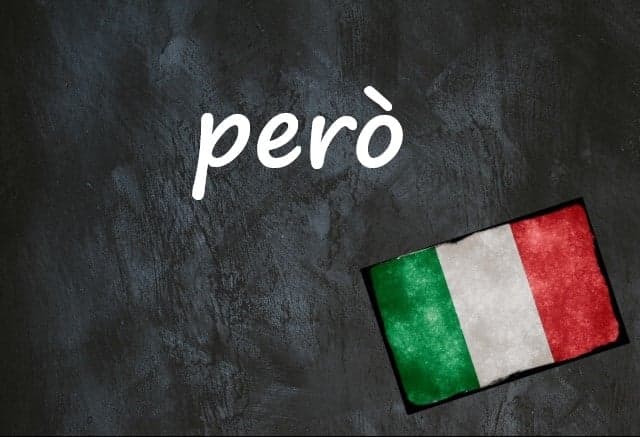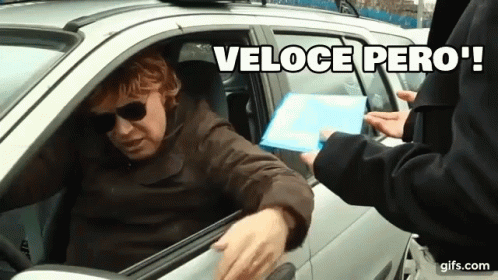Italian word of the day: 'Però'

It may be small, but this little word packs a punch.
Like many students of Italian, I first learned però as 'but' – but that 'but' doesn't really do this ubiquitous word justice, as I soon found out.
That's not to say you can't use però just the same way you'd say a forceful 'but'.
L'ho incontrata per strada, però ha fatto finta di non riconoscermi.
I saw her in the street, but she pretended not to recognize me.
É brutto, però è simpatico.
He's ugly, but he's nice.
But while in English we always put 'but' at the beginning of a contradicting clause – and the same goes for ma, the other common Italian word for 'but' – però can go in various positions in your sentence, including at the end. It's like 'though' in that respect.
Non è mica scemo, però!
He's not the least bit stupid, though!
È bello, però.
It's beautiful, though.
(NB: you'll hear this phrase used all the time in Italy to excuse just about anything.)

And like 'though', però has what linguists call a "concessive value": you can use it to concede that something is true even if you've just said something else that would suggest it isn't.
In English we might also use phrases like 'nevertheless', 'however' or 'yet' to make the same point.
Sono stanca, non tanto però da non poter finire.
I'm tired, yet not so tired as not to be able to finish.
Se non vuoi andarci tu, devi però mandarci qualcuno.
If you don't want to go yourself, you have to send somebody nevertheless.
I recently listened to an elderly (and I assume, hard of hearing) signora sustain a monologue about her summer plans for the duration of a 20-minute bus ride through Tuscany, fuelled largely by trailing "peròooooo..."s that allowed her to keep adding to her point. So do not be afraid to use però liberally.
In spoken Italian you can even reinforce it by preceding it with ma ('but BUT'!), though the dictionary politely advises you not to do so in 'proper' language, for instance when you're writing a formal letter.
Io ti aiuto, ma però qualche piccolo sforzo devi farlo anche tu.
I'll help you, but you have to make a bit of an effort too.
The one other use to watch out for is when you hear an Italian speaker exclaim però at the start of their sentence: it's sometimes used to express surprise, in either a good or a bad way, like 'well!' or 'wow'.
Però, che coraggio hai avuto.
Wow, how brave you've been.
Però, che maleducato!
Well! How rude!

And just in case you were wondering how important that little accent on the O really is: very. Without it, pero means something quite different – 'pear tree'.
If you're struggling to find it on your keyboard, these tips should help.
Do you have an Italian word you'd like us to feature? If so, please email us with your suggestion.
Comments
See Also
Like many students of Italian, I first learned però as 'but' – but that 'but' doesn't really do this ubiquitous word justice, as I soon found out.
That's not to say you can't use però just the same way you'd say a forceful 'but'.
L'ho incontrata per strada, però ha fatto finta di non riconoscermi.
I saw her in the street, but she pretended not to recognize me.
É brutto, però è simpatico.
He's ugly, but he's nice.
But while in English we always put 'but' at the beginning of a contradicting clause – and the same goes for ma, the other common Italian word for 'but' – però can go in various positions in your sentence, including at the end. It's like 'though' in that respect.
Non è mica scemo, però!
He's not the least bit stupid, though!
È bello, però.
It's beautiful, though.
(NB: you'll hear this phrase used all the time in Italy to excuse just about anything.)

And like 'though', però has what linguists call a "concessive value": you can use it to concede that something is true even if you've just said something else that would suggest it isn't.
In English we might also use phrases like 'nevertheless', 'however' or 'yet' to make the same point.
Sono stanca, non tanto però da non poter finire.
I'm tired, yet not so tired as not to be able to finish.
Se non vuoi andarci tu, devi però mandarci qualcuno.
If you don't want to go yourself, you have to send somebody nevertheless.
I recently listened to an elderly (and I assume, hard of hearing) signora sustain a monologue about her summer plans for the duration of a 20-minute bus ride through Tuscany, fuelled largely by trailing "peròooooo..."s that allowed her to keep adding to her point. So do not be afraid to use però liberally.
In spoken Italian you can even reinforce it by preceding it with ma ('but BUT'!), though the dictionary politely advises you not to do so in 'proper' language, for instance when you're writing a formal letter.
Io ti aiuto, ma però qualche piccolo sforzo devi farlo anche tu.
I'll help you, but you have to make a bit of an effort too.
The one other use to watch out for is when you hear an Italian speaker exclaim però at the start of their sentence: it's sometimes used to express surprise, in either a good or a bad way, like 'well!' or 'wow'.
Però, che coraggio hai avuto.
Wow, how brave you've been.
Però, che maleducato!
Well! How rude!

And just in case you were wondering how important that little accent on the O really is: very. Without it, pero means something quite different – 'pear tree'.
If you're struggling to find it on your keyboard, these tips should help.
Do you have an Italian word you'd like us to feature? If so, please email us with your suggestion.

Join the conversation in our comments section below. Share your own views and experience and if you have a question or suggestion for our journalists then email us at [email protected].
Please keep comments civil, constructive and on topic – and make sure to read our terms of use before getting involved.
Please log in here to leave a comment.